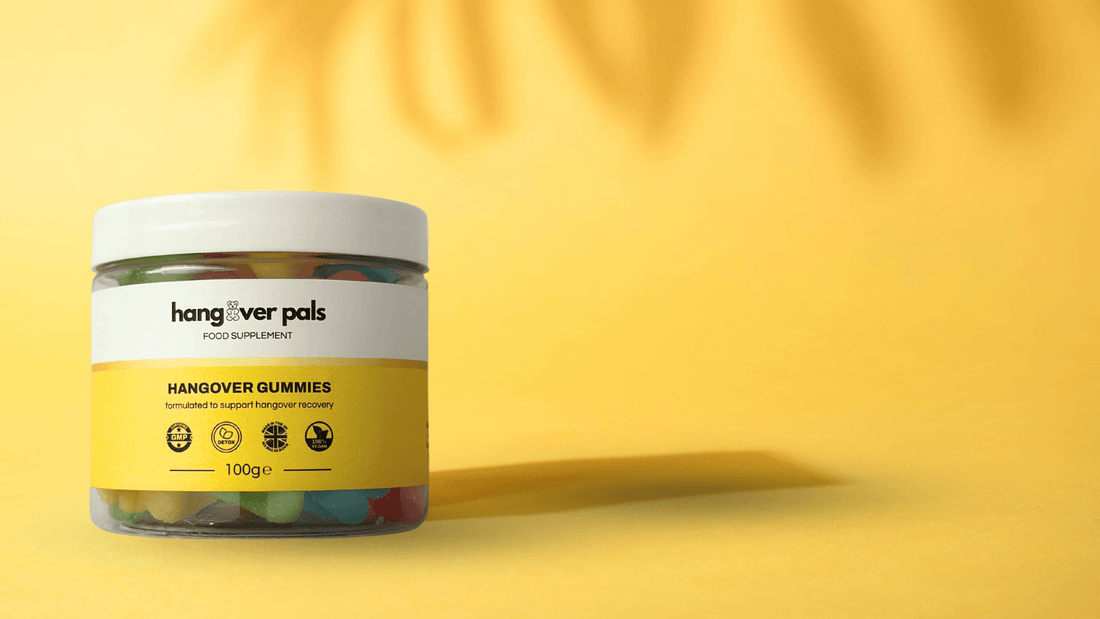
The Ultimate Guide to Beating Hangovers: Science-Backed Tips & Remedies
Share
We've all been there—that morning-after misery when your body seems to be revolting against last night's fun. But what's actually happening inside your body during a hangover?
At its core, a hangover is your body's multi-system response to alcohol consumption. When you drink, your liver works overtime to metabolize ethanol (the type of alcohol in beverages) using an enzyme called alcohol dehydrogenase. This process creates acetaldehyde, a toxic compound that's actually about 30 times more harmful than alcohol itself. Your body then scrambles to break down this toxin using another enzyme called acetaldehyde dehydrogenase and an antioxidant called glutathione.
The problem? Your liver can only process about one standard drink per hour. When you exceed this limit, acetaldehyde builds up in your bloodstream while your glutathione stores become depleted. This toxic accumulation is primarily responsible for those classic hangover symptoms.
Simultaneously, alcohol acts as a powerful diuretic, increasing urination and leading to significant fluid loss. In fact, for every alcoholic drink you consume, your body eliminates about 4 times that amount in urine. This doesn't just cause dehydration—it also flushes out essential electrolytes and nutrients your body needs to function properly.
What's more, alcohol disrupts your sleep architecture. While it might help you fall asleep initially, it prevents you from reaching those deep, restorative stages of sleep. This sleep disruption contributes to the fatigue and cognitive fog that characterize the morning after.
Understanding these biological mechanisms helps explain why Hangover Pals' Recovery Gummies are formulated to address multiple aspects of hangover physiology—targeting not just one symptom, but the underlying processes that create that morning-after misery.
Scientific Insights into Hangover Symptoms
Those throbbing headaches and waves of nausea aren't just your body punishing you—they're complex physiological responses with scientific explanations.
The dehydration we discussed earlier directly contributes to your headache through brain tissue shrinkage. When dehydrated, your brain actually contracts slightly, pulling away from the skull and triggering pain receptors in the surrounding membrane. This mechanism explains why rehydration often provides rapid, though partial, relief.
Your digestive distress stems from alcohol's irritating effect on your stomach lining. Alcohol stimulates acid production and delays stomach emptying, creating that queasy, unsettled feeling. Research from the Journal of Clinical Investigation shows alcohol also triggers inflammation in your gastrointestinal tract, which explains why your stomach feels particularly sensitive.
Perhaps most interesting is the immune system's role in hangovers. Recent studies published in Alcohol and Alcoholism reveal that hangover symptoms closely resemble an inflammatory response. Your immune system essentially treats alcohol's byproducts as invaders, releasing cytokines (inflammatory messengers) that cause fatigue, concentration problems, and general malaise—remarkably similar to how you feel during a mild illness.
The electrolyte imbalance caused by alcohol's diuretic effect creates additional complications. Potassium, magnesium, and sodium levels drop significantly, affecting everything from muscle function to nerve signaling. This electrolyte disruption explains the weakness, irritability, and even heart palpitations some people experience during severe hangovers.
Effective Remedies for Hangovers
Understanding the science behind hangover symptoms naturally leads us to the question: what actually works to relieve them? While countless remedies exist—from greasy breakfasts to "hair of the dog"—the science supports only some approaches.
Hydration remains the cornerstone of hangover recovery, but not all fluids are created equal. Electrolyte-enhanced beverages outperform plain water by addressing both fluid and mineral deficiencies. A study in the Journal of Strength and Conditioning Research found that beverages containing sodium, potassium, and glucose accelerated rehydration by 40% compared to water alone.
Anti-inflammatory compounds show particular promise in addressing the immune response component of hangovers. Traditional remedies like ginger have scientific backing—research in the European Review for Medical and Pharmacological Sciences confirms ginger's effectiveness in reducing nausea through both anti-inflammatory pathways and by accelerating gastric emptying.
B vitamins play a crucial role in alcohol metabolism and recovery. Alcohol depletes B vitamins rapidly, particularly B1 (thiamine) and B6 (pyridoxine), which are essential for energy production and neurotransmitter synthesis. Replenishing these vitamins can significantly reduce hangover duration according to research published in the Annals of Internal Medicine.
This is where Hangover Pals' Recovery Gummies offer a distinct advantage over piecemeal approaches. Rather than cobbling together various supplements and remedies, these gummies deliver a precisely formulated blend of electrolytes, anti-inflammatories, B vitamins, and detoxifying compounds in a single, convenient dose. The gummy format also addresses a practical challenge—swallowing pills can be particularly unpleasant when you're already nauseated.
What sets these gummies apart is their bioavailability. The formulation includes compounds like dihydromyricetin (DHM), which studies in the Journal of Neuroscience have shown can accelerate alcohol metabolism and reduce hangover severity by up to 50%. The gummies' delivery system ensures these active ingredients enter your bloodstream rapidly, providing relief when you need it most.
Many users report feeling improvement within 30-45 minutes after taking Recovery Gummies—significantly faster than most traditional remedies. This rapid action reflects thoughtful formulation based on the latest hangover science rather than folk wisdom or placebo effects.
How Hangover Pals' Recovery Gummies Work
The magic of Hangover Pals' Recovery Gummies lies in their comprehensive, science-backed formulation that targets multiple hangover mechanisms simultaneously. Let's break down what makes these gummies so effective.
At the core of the formula is DHM (Dihydromyricetin), a powerful compound extracted from the Japanese raisin tree that's been clinically shown to accelerate alcohol metabolism. DHM works by boosting the activity of alcohol dehydrogenase and acetaldehyde dehydrogenase—the very enzymes your liver uses to break down alcohol's toxic byproducts. By enhancing this natural process, DHM helps clear acetaldehyde from your system up to 50% faster than your body could manage alone.
The electrolyte complex in these gummies contains precisely balanced sodium, potassium, and magnesium—the exact minerals depleted during alcohol consumption. This isn't just about replacing lost electrolytes; it's about restoring the electrical gradients needed for proper nerve and muscle function. The result? Relief from those muscle aches and brain fog that make hangovers so debilitating.
To combat the inflammatory cascade triggered by alcohol, Recovery Gummies include a powerful antioxidant blend featuring milk thistle, N-acetyl cysteine (NAC), and vitamin C. These ingredients work synergistically to replenish glutathione—your body's master antioxidant that gets depleted during alcohol metabolism. This antioxidant restoration helps neutralize the free radicals generated during alcohol breakdown that contribute to that "hit by a truck" feeling.
The B-vitamin complex (including B1, B2, B6, and B12) addresses alcohol's notorious depletion of these essential nutrients. These vitamins are crucial cofactors in energy production pathways, helping restore your cellular energy factories to full function. They're particularly important for brain cell recovery, which explains why users report significant improvements in mental clarity.
What truly sets these gummies apart is their delivery system. The pectin-based gummy matrix allows for gradual release of active ingredients, providing sustained relief rather than the spike-and-crash pattern of many hangover pills. The pleasant taste and gentle digestion also mean you can take them even when your stomach feels questionable.
Practical Tips for a Speedy Recovery
While Recovery Gummies provide powerful relief, combining them with strategic recovery habits can dramatically accelerate your bounce-back time. Timing matters significantly—taking the gummies before bed after drinking can prevent the worst symptoms from developing overnight, when dehydration and inflammation typically peak.
Sleep quality plays a crucial role in hangover recovery, though alcohol disrupts normal sleep architecture. Create optimal conditions by keeping your bedroom cool (around 65°F/18°C), as research in the Journal of Physiological Anthropology shows this temperature range promotes deeper sleep even when sleep quality is compromised. Consider using blackout curtains to block morning light, as alcohol sensitizes your eyes to brightness.
Your morning meal choices can either help or hinder recovery. Focus on easily digestible carbohydrates that restore glycogen levels without taxing your irritated digestive system. Bananas offer a perfect trifecta of benefits: easily tolerated carbohydrates, potassium for electrolyte replenishment, and magnesium that helps relax tension headaches. Pair with toast spread with honey for quick glucose that helps your brain recover.
Gentle movement promotes circulation and accelerates toxin clearance. A 15-minute walk increases oxygen delivery to tissues by approximately 20%, helping your liver process remaining alcohol byproducts more efficiently. The natural endorphin release also provides mood elevation when you're feeling low.
Avoid common recovery mistakes like caffeine overload, which further dehydrates you, or taking NSAIDs like ibuprofen on an empty stomach, which can worsen gastric irritation. Instead, time your Recovery Gummies with gentle rehydration and strategic nutrition for a comprehensive recovery approach.
